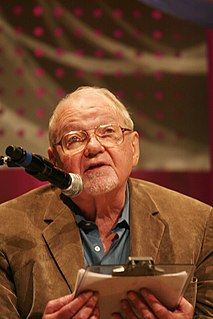A Quote by Adena Friedman
We believe behavioral science, cognitive computing, and machine intelligence are essential to a successful, holistic surveillance offering and critical to efficient and effective organizational compliance with an increasingly intricate global regulatory environment.
Related Quotes
I would like to emphasize strongly my belief that the era of computing chemists, when hundreds if not thousands of chemists will go to the computing machine instead of the laboratory for increasingly many facets of chemical information, is already at hand. There is only one obstacle, namely that someone must pay for the computing time.
I now believe that the universe was brought into existence by an infinite Intelligence. I believe that this universe's intricate laws manifest what scientists have called the Mind of God. I believe that life and reproduction originate in a divine Source. Why do I believe this, given that I expounded and defended atheism for more than a half century? The short answer is this: this is the world picture, as I see it, that has emerged from modern science.
As the Ranking Democrat on the House Intelligence Committee, I have been briefed since 2003 on a highly classified NSA foreign collection program that targeted Al Qaeda. I believe the program is essential to US national security and that its disclosure has damaged critical intelligence capabilities.
There is a strong current in contemporary culture advocating ' holistic ' views as some sort of cure-all... Reductionism implies attention to a lower level while holistic implies attention to higher level. These are intertwined in any satisfactory description: and each entails some loss relative to our cognitive preferences, as well as some gain... there is no whole system without an interconnection of its parts and there is no whole system without an environment.
The United States is strongly committed to the IPCC process of international cooperation on global climate change. We consider it vital that the community of nations be drawn together in an orderly, disciplined, rational way to review the history of our global environment, to assess the potential for future climate change, and to develop effective programs. The state of the science, the social and economic impacts, and the appropriate strategies all are crucial components to a global resolution. The stakes here are very high; the consequences, very significant.
Insofar as the theorist wins, therefore, by constructing an increasingly closed and terrifying machine, to that very degree he loses, since the critical capacity of his work is thereby paralysed, and the impulses of negation and revolt, not to speak of those of social transformation, are increasingly perceived as vain and trivial in the face of the model itself.



































